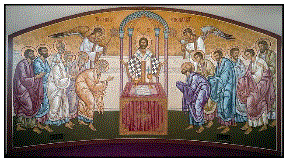In the two Byzantine anaphora texts the object of remembrance becomes: the passion, cross, burial, resurrection after three days, ascent into heaven, sitting at the right hand of the Father, and the second coming in glory.
Even more enlightening than the lengthened list of saving acts in the anamnesis proper is the repercussion of the anamnesis on the form of the command to “do in memory” and of the account of institution. In the liturgy of Basil the anamnesis command is so formulated that not only Paul’s words: “For as often as you eat this bread and drink this cup, you proclaim the Lord’s death until He comes,”(1 Cor 11:26) but also its liturgical expansion: “and confess my resurrection,” are put into the mouth of the Lord himself as a continuation of his own words: “Do this in remembrance of me.”
At this period (4th Century) the idea of the eucharistic celebration as a re-presentation and even an identical image of the Last Supper was interpreted in such concrete terms that the biblical account of institution underwent a further assimilation to current liturgical practice. In Basil’s anaphora the words over the bread were: “He gave thanks and blessed it, sanctified it, broke it and gave it to his holy disciples.” The words over the chalice were: “He mixed the wine and water, gave thanks and blessed it, sanctified it, and gave it to his holy disciples.
Also indicative of the greater emphasis on the anamenetic character of the eucharist is another alteration in the Basilian redaction (i.e., Basil the Great) of the anaphora. The older expression: “He left us this great mystery of his love,” which occurred in the transition to the account of institution, is now made more concrete, in keeping with the liturgical anamnesis: “He left us as a memorial of his saving passion that which we have offered in accordance with his commission.”
The Basilian redaction of the anaphora already offered an example of how, in the age of the Second Ecumenical Council, the passages of the anaphora that dealt with the Holy Spirit called for greater emphasis and expansion. This was true in particular of the epiclesis.
Hopefully all of my readers are quite aware of what the anaphora and the epiclesis are.
Seek and you will find!

